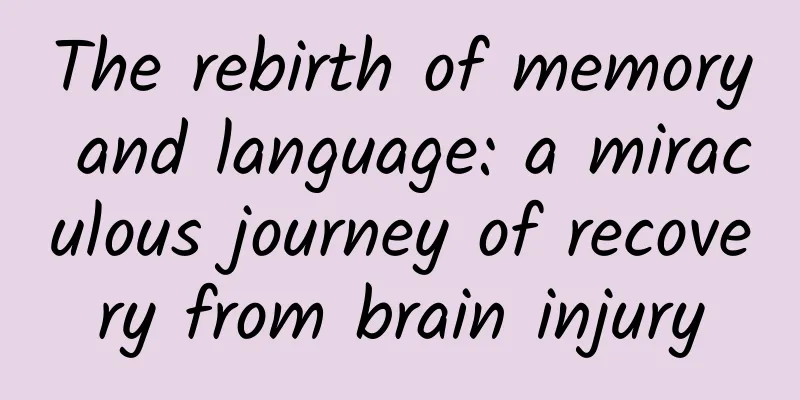The rebirth of memory and language: a miraculous journey of recovery from brain injury

|
Author: Zhang Hao, Chief Physician, China Rehabilitation Research Center (Beijing Boai Hospital) Reviewer: Hu Wenli, Chief Physician, Beijing Chaoyang Hospital, Capital Medical University Brain trauma, as a common neurological injury, often has a profound impact on patients and their families. After experiencing brain trauma, patients may face a series of complex rehabilitation problems, including but not limited to memory impairment, difficulty in language comprehension and expression, visual-spatial impairment, and mental disorders. The following will explore in depth the rehabilitation treatment after brain trauma in order to provide patients and their families with a more comprehensive understanding and guidance. After a brain injury, patients often experience memory impairment. This impairment may manifest as loss of recent memory, that is, the patient cannot form or retain memories of recent events or people they have come into contact with, while long-term memories are relatively preserved. For example, the patient may have just talked to someone, but then cannot recall the other person's identity or the content of the conversation. This recent memory impairment is one of the most common symptoms after a brain injury. In addition, some patients may also experience global amnesia, that is, complete loss of memory for the entire injury period or a longer period of time. This phenomenon is called post-traumatic amnesia. Fortunately, after standardized rehabilitation training, most patients' memory function will be restored to a certain extent. Training may include the use of auxiliary tools such as notepads and alarm clocks, as well as reminding patients through daily activities and memory training methods, so as to help them gradually restore their memory ability. During the training process, the patience and cooperation of family members are crucial. They need to help patients recall and consolidate their memories through simple reminders and stimulation. Figure 1 Original copyright image, no permission to reprint In addition to memory impairment, patients with brain trauma may also face difficulties in language comprehension and expression. This is mainly manifested in aphasia and cognitive impairment. Sensory aphasia in aphasia will cause problems in the patient's understanding of language, that is, they cannot understand what others are saying. Cognitive impairment may prevent patients from correctly understanding questions or instructions. For such problems, rehabilitation therapy needs to intervene according to specific causes. For example, for patients with sensory aphasia, therapists may help patients enhance their ability to understand language through object reminders, text comprehension training, etc. At the same time, for patients with motor aphasia, that is, those who can understand but cannot express clearly, therapists will focus on pronunciation training and improving oral expression skills. This includes word training, short sentence training, and reading aloud exercises, etc., aimed at helping patients gradually restore normal language expression ability. Patients with brain trauma may also experience writing difficulties. This may be due to damage to the brain areas related to writing, which makes the patient unable to write or has difficulty writing. In addition, paralysis may also make it impossible for the patient to hold a pen and write. For such problems, rehabilitation therapists will develop personalized training plans based on the specific circumstances of the patient. For example, for patients with agraphia, therapists may ask the patient to copy simple words or sentences first, and then gradually transition to independent writing. For patients who cannot write due to paralysis, therapists may recommend hand-switching training, that is, using the non-dominant hand for writing exercises. At the same time, training the patient's grasping ability and fine motor skills can also help improve their writing function. Unilateral spatial neglect is another common visual-spatial disorder after brain trauma. Patients may not be able to notice or see objects or space on one side of the body, which can lead to a range of problems in daily life. For example, patients may only eat one side of the bowl while ignoring the food on the other side. To treat this disorder, rehabilitation therapists will take a series of measures to stimulate the patient's spatial perception on the affected side. This includes adjusting the ward environment, using visual tracking training, and conducting elimination experiments. Through these training, patients can gradually improve their attention and perception of space on the affected side. Figure 2 Original copyright image, no permission to reprint In addition, patients with brain trauma may also develop mental disorders such as mania. Such patients often require more special care and attention. In order to provide a quiet and comfortable environment, therapists will recommend that patients be placed in relatively quiet wards and avoid excessive light stimulation. At the same time, family members and medical staff also need to pay special attention to their tone and attitude when communicating with patients to avoid angering patients or triggering aggressive behavior. For patients who may exhibit aggressive behavior, family members need to take additional safety measures, such as putting bracelets on patients and ensuring that there is always someone watching over the patients. |
>>: The Big Question of "Poop": Unlock the "Health Code" Hidden in Poop
Recommend
Yoga poses during menstruation
The female menstrual period occupies nearly one-f...
What to do if a 15-year-old girl gets pregnant
Many girls nowadays are very open in terms of bot...
What is the best way to treat emphysema in the middle-aged and elderly? How effective is traditional Chinese medicine in treating emphysema?
Author: Chen Zhenchong Unit: Department of Tradit...
Is eating oranges good for the fetus during pregnancy?
In the early stages of pregnancy, some pregnant w...
Woman drinking Qi-Yin Yang Xue oral liquid
Taking nourishing and health-preserving Chinese h...
What can you eat to replenish blood during pregnancy?
Anemia during pregnancy is a common condition. Ma...
How to use medicine for itchy lower body during pregnancy
Women should pay attention to their physical heal...
A weak positive result was detected three days before menstruation
Many couples hope to have their own baby immediat...
What medicine is good for uterine cyst?
Female friends are often threatened and harmed by...
Brown leucorrhea after menstruation
Many women have experienced brown discharge from ...
What medicine should pregnant women use for eczema?
Many pregnant women will suffer from eczema durin...
What's the matter with bloodshot after having sex?
Some people may experience bleeding due to narrow...
Is it normal to vomit during pregnancy?
Most pregnant women will experience nausea and re...
What should women eat before pregnancy preparation?
At present, more and more couples are beginning t...
Normal progesterone value table for 36 days of pregnancy
If a pregnant woman has low progesterone, she nee...









